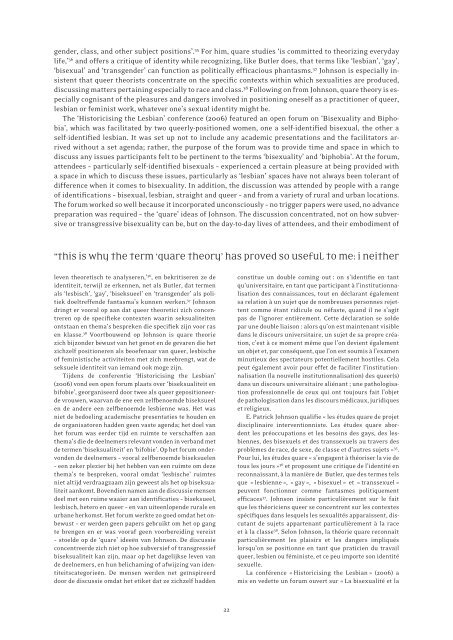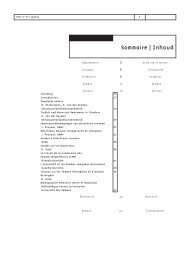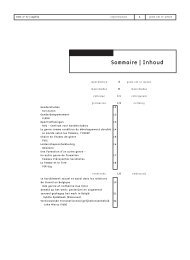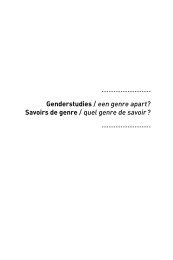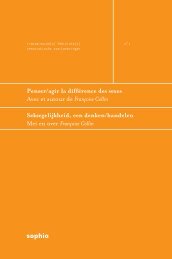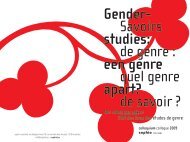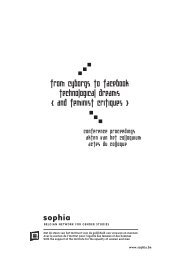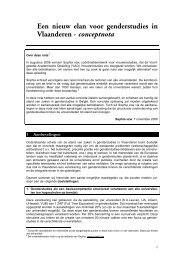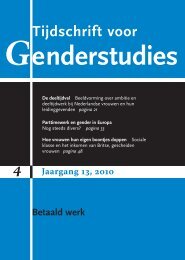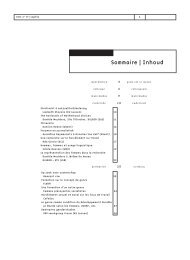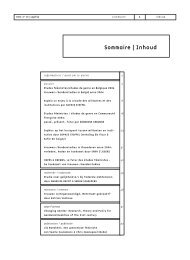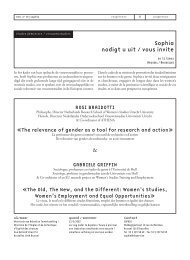You also want an ePaper? Increase the reach of your titles
YUMPU automatically turns print PDFs into web optimized ePapers that Google loves.
gender, class, and other subject positions’. 35 For him, quare studies ‘is committed to theorizing everyday<br />
life,’ 36 and offers a critique of identity while recognizing, like Butler does, that terms like ‘lesbian’, ‘gay’,<br />
‘bisexual’ and ‘transgender’ can function as politically efficacious phantasms. 37 Johnson is especially insistent<br />
that queer theorists concentrate on the specific contexts within which sexualities are produced,<br />
discussing matters pertaining especially to race and class. 38 Following on from Johnson, quare theory is especially<br />
cognisant of the pleasures and dangers involved in positioning oneself as a practitioner of queer,<br />
lesbian or feminist work, whatever one’s sexual identity might be.<br />
The ‘Historicising the Lesbian’ conference (<strong>2006</strong>) featured an open forum on ‘Bisexuality and Biphobia’,<br />
which was facilitated by two queerly-positioned women, one a self-identified bisexual, the other a<br />
self-identified lesbian. It was set up not to include any academic presentations and the facilitators arrived<br />
without a set agenda; rather, the purpose of the forum was to provide time and space in which to<br />
discuss any issues participants felt to be pertinent to the terms ‘bisexuality’ and ‘biphobia’. At the forum,<br />
attendees – particularly self-identified bisexuals – experienced a certain pleasure at being provided with<br />
a space in which to discuss these issues, particularly as ‘lesbian’ spaces have not always been tolerant of<br />
difference when it comes to bisexuality. In addition, the discussion was attended by people with a range<br />
of identifications – bisexual, lesbian, straight and queer – and from a variety of rural and urban locations.<br />
The forum worked so well because it incorporated unconsciously – no trigger papers were used, no advance<br />
preparation was required – the ‘quare’ ideas of Johnson. The discussion concentrated, not on how subversive<br />
or transgressive bisexuality can be, but on the day-to-day lives of attendees, and their embodiment of<br />
“this is why the term ‘quare theory’ has proved so useful to me: i neither<br />
leven theoretisch te analyseren,’ 36 , en bekritiseren ze de<br />
identiteit, terwijl ze erkennen, net als Butler, dat termen<br />
als ‘lesbisch’, ‘gay’, ‘biseksueel’ en ‘transgender’ als politiek<br />
doeltreffende fantasma’s kunnen werken. 37 Johnson<br />
dringt er vooral op aan dat queer theoretici zich concentreren<br />
op de specifieke contexten waarin seksualiteiten<br />
ontstaan en thema’s bespreken die specifiek zijn voor ras<br />
en klasse. 38 Voortbouwend op Johnson is quare theorie<br />
zich bijzonder bewust van het genot en de gevaren die het<br />
zichzelf positioneren als beoefenaar van queer, lesbische<br />
of feministische activiteiten met zich meebrengt, wat de<br />
seksuele identiteit van iemand ook moge zijn.<br />
Tijdens de conferentie ‘Historicising the Lesbian’<br />
(<strong>2006</strong>) vond een open forum plaats over ‘biseksualiteit en<br />
bifobie’, georganiseerd door twee als queer gepositioneerde<br />
vrouwen, waarvan de ene een zelfbenoemde biseksueel<br />
en de andere een zelfbenoemde lesbienne was. Het was<br />
niet de bedoeling academische presentaties te houden en<br />
de organisatoren hadden geen vaste agenda; het doel van<br />
het forum was eerder tijd en ruimte te verschaffen aan<br />
thema’s die de deelnemers relevant vonden in verband met<br />
de termen ‘biseksualiteit’ en ‘bifobie’. Op het forum ondervonden<br />
de deelnemers – vooral zelfbenoemde biseksuelen<br />
– een zeker plezier bij het hebben van een ruimte om deze<br />
thema’s te bespreken, vooral omdat ‘lesbische’ ruimtes<br />
niet altijd verdraagzaam zijn geweest als het op biseksualiteit<br />
aankomt. Bovendien namen aan de discussie mensen<br />
deel met een ruime waaier aan identificaties – biseksueel,<br />
lesbisch, hetero en queer – en van uiteenlopende rurale en<br />
urbane herkomst. Het forum werkte zo goed omdat het onbewust<br />
– er werden geen papers gebruikt om het op gang<br />
te brengen en er was vooraf geen voorbereiding vereist<br />
– stoelde op de ‘quare’ ideeën van Johnson. De discussie<br />
concentreerde zich niet op hoe subversief of transgressief<br />
biseksualiteit kan zijn, maar op het dagelijkse leven van<br />
de deelnemers, en hun belichaming of afwijzing van identiteitscategorieën.<br />
De mensen werden net geïnspireerd<br />
door de discussie omdat het etiket dat ze zichzelf hadden<br />
constitue un double coming out : on s’identifie en tant<br />
qu’universitaire, en tant que participant à l’institutionnalisation<br />
des connaissances, tout en déclarant également<br />
sa relation à un sujet que de nombreuses personnes rejettent<br />
comme étant ridicule ou néfaste, quand il ne s’agit<br />
pas de l’ignorer entièrement. Cette déclaration se solde<br />
par une double liaison : alors qu’on est maintenant visible<br />
dans le discours universitaire, un sujet de sa propre création,<br />
c’est à ce moment même que l’on devient également<br />
un objet et, par conséquent, que l’on est soumis à l’examen<br />
minutieux des spectateurs potentiellement hostiles. Cela<br />
peut également avoir pour effet de faciliter l’institutionnalisation<br />
(la nouvelle institutionnalisation) des queer(s)<br />
dans un discours universitaire aliénant ; une pathologisation<br />
professionnelle de ceux qui ont toujours fait l’objet<br />
de pathologisation dans les discours médicaux, juridiques<br />
et religieux.<br />
E. Patrick Johnson qualifie « les études quare de projet<br />
disciplinaire interventionniste. Les études quare abordent<br />
les préoccupations et les besoins des gays, des lesbiennes,<br />
des bisexuels et des transsexuels au travers des<br />
problèmes de race, de sexe, de classe et d’autres sujets » 35 .<br />
Pour lui, les études quare « s’engagent à théoriser la vie de<br />
tous les jours » 36 et proposent une critique de l’identité en<br />
reconnaissant, à la manière de Butler, que des termes tels<br />
que « lesbienne », « gay », « bisexuel » et « transsexuel »<br />
peuvent fonctionner comme fantasmes politiquement<br />
efficaces 37 . Johnson insiste particulièrement sur le fait<br />
que les théoriciens queer se concentrent sur les contextes<br />
spécifiques dans lesquels les sexualités apparaissent, discutant<br />
de sujets appartenant particulièrement à la race<br />
et à la classe 38 . Selon Johnson, la théorie quare reconnaît<br />
particulièrement les plaisirs et les dangers impliqués<br />
lorsqu’on se positionne en tant que praticien du travail<br />
queer, lesbien ou féministe, et ce peu importe son identité<br />
sexuelle.<br />
La conférence « Historicising the Lesbian » (<strong>2006</strong>) a<br />
mis en vedette un forum ouvert sur « La bisexualité et la<br />
22


